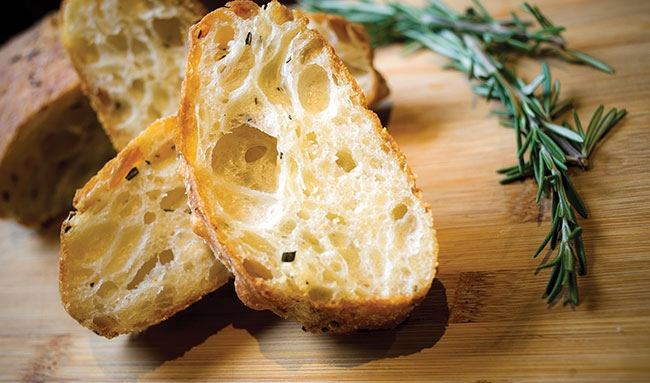
What’s ahead for bread?
October 18, 2018
By Karen Marazzo
How one bakery became trendy by ignoring bread trends
 Campbell-Luxton is excited about the resurgence of slow fermented sourdoughs. Photo credit: Ashley Fraser.
Campbell-Luxton is excited about the resurgence of slow fermented sourdoughs. Photo credit: Ashley Fraser.As Canadian consumers continue feeding their appetites for low carbohydrate, reduced sugar, and gluten-free foods, bakers such as Chef Jan Campbell-Luxton bake on, unburdened by the latest food trends.
Campbell-Luxton creates organic, artisan breads and pastries from his original bakery, De la Terre bakery in Jordan, Ontario using his “hundreds-year-old style of bread.”
He and his staff supply 15 to 20 wholesalers and 12 farmers markets between Niagara-on-the-Lake to Toronto.
“I don’t want to lose creditability by reacting to the latest craze. I just do what I do naturally. I’m committed to foregrounding locally produced foods and their producers, as well as encouraging consumer support of organic and sustainable agricultural practices,” he said. “And what we do with our traditional techniques and ingredients just happens to overlap with the current market trends.”
Looking towards the future, Campbell-Luxton believes bread consumers will continue to place emphasis on natural sweeteners, plant-based foods, convenience, waste reduction, and gut health. His primary concern is the “market surge about gluten-free products and consumption.”
“People need to take into the account the ‘process’, because many products claiming to be gluten free use a process that includes high quantities of commercial yeast, salt and sugars,” he said, warning consumers that some bakers’ methods may undercut nutritional quality.
Further, he says his mission is to educate the public against pop culture headlines –genetically modified food (GMO) being a big one. “Canadian-grown wheat is GMO-free. Working with customers to try and get them to understand the process and labour involved in one thing. The other is trying to dispel myths and have people embrace real bread. You have to wonder how natural is a loaf of bread that can last up to two weeks?”
Other emerging trends to which De la Terre bakery already aspires, are authenticity and sustainability. Baked goods are all natural, with no dairy or animal products with the exception of the Honey Walnut or Honey Butter breads. Campbell-Luxton states that “vegan is becoming less of niche trend and more mainstream.”
With consumer interest in the sustainability of our food systems and environmental stewardship, he says they use biodegradable and compostable take-out containers, cutlery, and napkins. “We are trying to normalize environmental factors as a way of life.” This includes waste reduction by sending scraps to the pig farmer, making bread donations to charity, composting and recycling to reduce garbage, and repurposing bread products to make crostini, bread crumbs and croutons.
He has a true passion for connecting people with their food, helping educate about where it comes from and how labour transforms it to become food. “There’s a rupture between producers and consumers of food that can have negative consequences,” he says, as in the case of clean label product trends.
“I find it needs to be stewarded with more care. It’s disconcerting the way words which are meant to demonstrate cleanliness and health consciousness are so widely marketed, making them lose meaning and intent.”
Asked whether he thinks most people view bread as an indulgence or a staple, Campbell-Luxton says the market is split. “There are those who view carbs and breads with suspicion, thinking it’s a poor health decision (based on fads like Atkins, Wheat Belly, South Beach diet), and those who are more educated.”
“Food fads will episodically scare people off bread,” he said. “It’s one of many foods that have long endured cycles of public misunderstanding. But it will continue to be a leading bakery segment. It’s central to how people nurture themselves and it can be a part of a healthy, balanced diet.”
His fare of time-honoured, labour intensive artisanal products include organic whole wheat, cheese and herb, honey and walnut, multigrain, multi-seed, sourdough, olive, spelt, and rye breads. With innovations stemming from an increased interest in whole grains and long slow fermentation, Campbell-Luxton is excited for the resurgence of products based on flavour and slow fermentation. “It’s exciting. It goes a long way of dismissing the hyperbole about grain consumption,” he said.
Deliberately fermented foods are becoming all the rage with evidence suggesting that their consumption has a positive impact on our digestive health. Campbell-Luxton believes they will continue to gain in popularity and is excited about an idea he’s been ‘fermenting’ in using old bread and beer, along with other experimental baking of potato sour dough, beet bread, sweet potato bread, tomato and sage breads.
Another area of interest is that of sprouted and heritage grains. “I’d love to see this take off and expand our own product lines,” he said, adding that he finds it “interesting to work with a flour that contains a much more dynamic enzyme activity and interesting taste profiles.”
While the bakery purchases flour and produce from small independent farmers where possible, he would love to mill his own grains where it not for the debilitating factor of too little working space. However they are “working closer with supply chains to find a mill we can work with, using my dad’s spelt and rye from the family farm that will be able to match our volumes and provide consistent distribution.”
With his own son suffering a wheat allergy, Campbell-Luxton has worked with many millers and growers in an attempt to find alternative grains. In the meantime he and his staff are dabbling with innovative experimentation using a host of original grains including Red Fife and Emmer, to name a few.
Commodity pricing, environmental change, and economic shifts all impact spending habits. Not being one to “trend hop”, Campbell-Luxton will go about baking his daily bread based on a decades-old tradition. “My basic way of thinking is, whatever way you slice it, bread is made to be enjoyed.”
Print this page
Leave a Reply